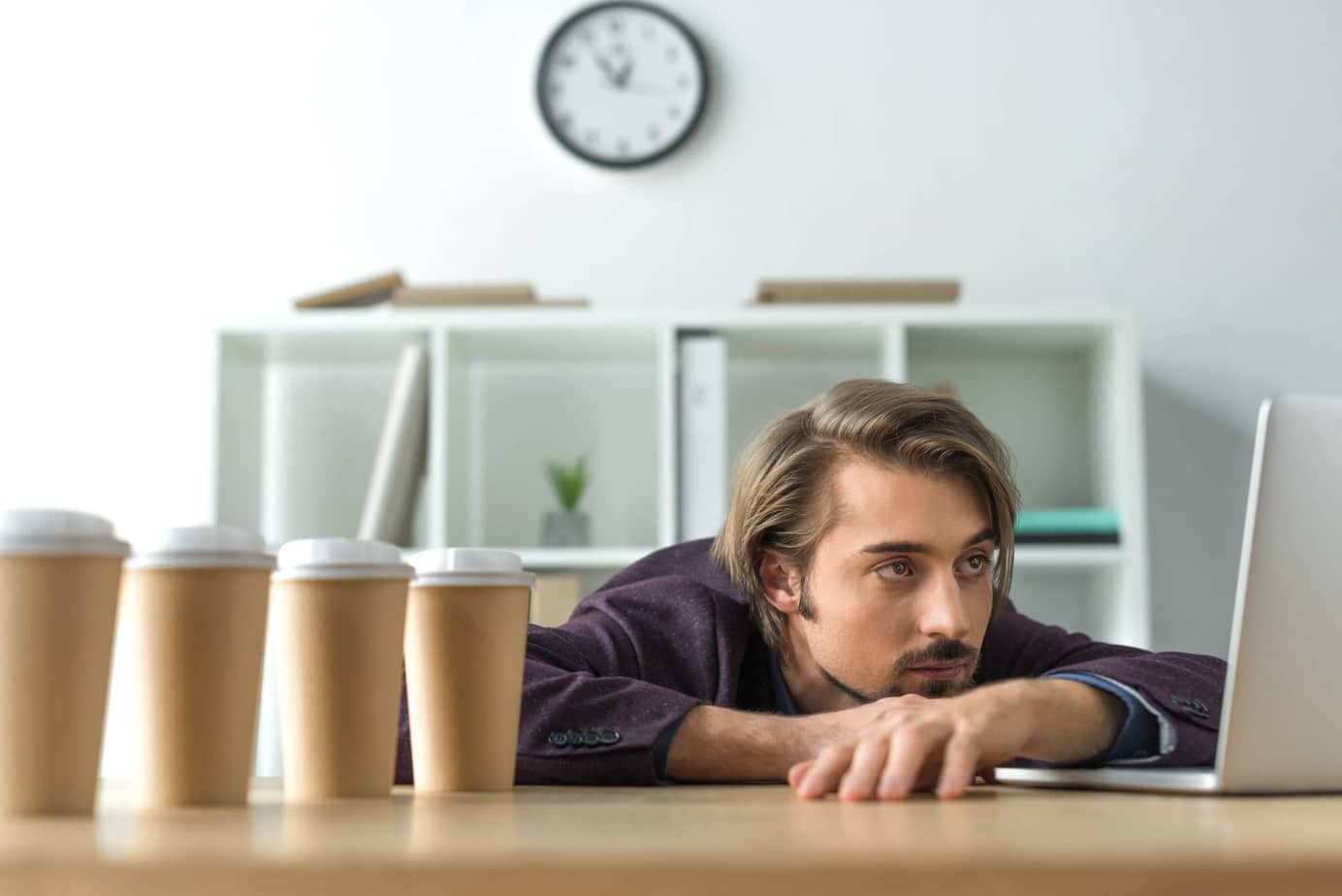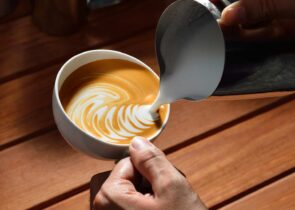You’re not alone if you reach for a cup of coffee or two to help you feel awake and alert during the day. Statista reports that 74 percent of Americans drink it daily, and we get it. Coffee is an easy, not to mention delicious, source of caffeine.
Despite coffee being a caffeinated beverage, some people find themselves ready to nod off after a serving of it, posing them to ask the million-dollar question: If it has caffeine, known for its stimulant effects, why does coffee make me tired?
That question, plus a few more, is just what we intend to answer here. We’re taking a closer look at the causes of and potential solutions for coffee-induced fatigue in hopes of helping regular coffee drinkers make the most of their morning (or afternoon) cups.

Why Does Coffee Make Me Tired Immediately?
When the afternoon slumps hit, many of our first instinct is to increase our caffeine intake by downing another cup of coffee. Sometimes, though, the effects of coffee are the opposite of what we intended; the caffeinated beverage gave you sleepy feelings instead of a much-needed jolt of energy. What gives?
Let’s find out.
You built up a bit of sleep debt.
Sleep debt, or sleep deficit, is the difference between the amount of sleep your body needs and the amount it had. For example, someone who needs nine hours of sleep but only got six racked up three hours of sleep debt.
It isn’t uncommon to reach for a shot of espresso when your sleep schedule was disrupted. And yes, the caffeine in a coffee drink can offer temporary respite.
However, repeatedly upping your coffee intake to compensate for lack of quality sleep won’t help; what you need is to catch a few Z’s.
That brings us to our next point.
You have a caffeine-related sleep deficit.
You’re probably doing more harm than good if a few extra doses of caffeine is your go-to after a night of lackluster sleep.
Here’s the problem here: the more caffeine you drink, the longer you stay awake. The longer you stay awake, the more convoluted your sleep cycle becomes and the more tired you become.
When you’re still tired, you’ll probably be tempted to pick up another cup of coffee. Before you know it, you’re stuck in a negative cycle; the caffeine you expected to solve your exhaustion problems is making them worse.
You feel adenosine again.
Your central nervous system produces adenosine, a chemical that controls your sleep-wake cycle. Adenosine levels gradually increase throughout the day, and as the body absorbs it, you begin to feel more tired.
Caffeine blocks adenosine receptors. So, as the adenosine is produced, you aren’t absorbing much — if any! — of it after consuming a coffee drink (unless it’s decaf coffee, of course).
When the caffeine from coffee wears off, all that blocked adenosine hits you all at once, leading to a significant energy slump and sudden drowsiness.
You’re dehydrated.
Caffeine is a diuretic, which means it can increase the urge to urinate. And if you don’t drink enough water in the first place, caffeine in coffee or other beverages pushes the little bit of H2O in your system out too quickly.
Plus, as a stimulant, caffeine elevates the heart rate. When this happens, the body’s temperature increases and the sweat begins pouring. When that happens, you can say goodbye to any water left in your system and hello to dehydration.
Fatigue and tiredness are symptoms of dehydration, as the decrease of fluid in your body impacts both blood pressure and blood flow (expect to long for a nap if your blood pressure is low or blood flow is slow).
A coffee addict’s first response to this tiredness is probably to pour another cup. This seems sensible at first since caffeinated drinks are known as energy boosters. But unless you pair your favorite dark roast with a few glasses of water, you’ll only make things worse.
You’re in a sugar slump.
Despite our mothers’ warnings during our childhood years, the sugar rush isn’t real. But the sugar crash — that overwhelming feeling of sluggishness that hits after you go too hard on the desserts — is no myth.
When there’s more sugar than usual in the body, the pancreas rushes to create more insulin to compensate. Then, unfortunately, blood sugar levels (also called glucose levels) drop. Energy depletes, too, and bam — there’s the sugar crash.
The excess sugar in your system might come from the sweetener in your morning joe. Your taste buds might like it, you heaping large spoonfuls of it into your cup, but unless you’re incorporating balance into your diet through practices like:
- Eating simple sugars with or after a meal,
- Increasing your protein and healthy fat intake, or
- Decreasing your sugar consumption,
… a sugar crash is probably in your future.
And so we’re clear – this doesn’t mean you have to completely cut sweeteners out of your coffee routine; moderate amounts are fine and probably won’t affect you much. But you might want to reconsider your coffee choices if you’re constantly sipping overly sweet drinks, especially those made with sugary syrups and whipped cream.
You developed a high caffeine tolerance.
Your cup of coffee might not be making you tired. The issue might be that it isn’t hyping you up like it used to. Regular caffeine consumption makes you develop a tolerance to it, meaning you need more of it than usual to feel any effects.
How to Fix It
Many coffee fans won’t consider ditching coffee altogether or opting for something decaffeinated. But here’s the good news – if you make a few adjustments to your coffee routine, you won’t need to give up your daily energy booster.
Sip Smarter
Per expert recommendations, no one should consume more than 400 milligrams of caffeine daily (FYI, that equals about two to four eight-ounce cups of brewed coffee).
The average person probably doesn’t have more than 300 milligrams of caffeinated coffee in a day, but someone who gets a few more milligrams of caffeine from other food and drinks very well might.
Avoid overdoing it by being a more conscious caffeine consumer. Keep track of everything you eat or drink that contains the stimulant, including soft drinks, energy drinks, or even certain pain relievers.
Keeping a lower amount of caffeine in your system throughout the day helps you better mitigate any negative effects.
Rather than chugging your coffee before heading out for the day, pour it into a travel mug and bring it with you to sip throughout the morning. Then, you can switch to something still caffeinated, but perhaps less so, around mid-day.
Hydrate
Hydration, or lack thereof, can be a serious issue for an avid coffee lover. Fortunately, this problem has an easy solution: up your water intake! Water is a must if you don’t want to give up your coffee habit.
The average adult male should aim for about 15 cups of water — a little less than a gallon — and the average adult female should try to drink about 11 cups. Those amounts might sound like ambitious daily goals, but remember – that includes water from food and other beverages.
As far as pure water is concerned, shoot for about half a liter daily. That’s 8 eight-ounce glasses of water. You might think that’s too much, but don’t panic.
Think of it this way: the average water bottle holds about 17 ounces. That means drinking about four of those, and that’s doable.
If you have trouble motivating yourself to drink water without adding a ton of sugary flavoring, try implementing an accountability system. There are plenty of apps for that if you’re looking for something low-maintenance.
Skip the Sugar
Sugar, like all else in life, is OK in moderation. But some people are more sensitive to it than others. So, if you already know you react strongly to it, consider cutting it out of your coffee routine entirely.
If you don’t like how your morning brew tastes by itself, experiment with different coffee beans or try another brewing method. Drinking black coffee takes some getting used to, but drinking it has some serious perks.
Some don’t want to jump on the black coffee bandwagon, even though it has some impressive health benefits. That’s where alternative sweeteners and sugar-free flavored syrups and creamers come in.
If you must have sugar in your cup, keep the quantity low — one or two spoonsful instead of your usual three to four (or five…).
Less sugar doesn’t have to be a bad thing. Quite the opposite, as it means you can detect more of your favorite beans’ tasting notes.
Do Some Self-Evaluation
The mid-day caffeine crash is real, but grabbing another latte isn’t the only solution. For example, having another cup of coffee won’t fix anything if you’re using it to gloss over the fact that you’re getting too few hours of sleep.
Lack of sleep is one possible culprit for sluggishness, but it isn’t the only one. High-stress levels, sedentary lifestyles, dietary habits, and hydration levels can affect your energy, as well. Getting to the root cause of your fatigue problem is the best way to solve it.
Cut Down the Caffeine
We said it before, and it’s worth bringing up again: decaffeinated coffee exists. Half-caffeinated beans do, too, and they’re a great choice for anyone particularly sensitive to the fatiguing effects of caffeine.
Decaffeinated or half-caff beans allow you to enjoy your favorite beverage with a less severe mid-afternoon crash, if there’s one at all. Combine this with one or two of the other tips here, and you’ll be good to go for sure.
Look Out for Caffeine Withdrawal Symptoms
You should know that cutting down on caffeine or cutting it out of your daily routine entirely might cause you to feel caffeine withdrawal symptoms — headache, fatigue, drowsiness, irritability, etc.
The good news is that caffeine withdrawal usually subsides within two to nine days, according to the National Institute of Health.
Make the effects of a caffeine withdrawal less intense by gradually decreasing your intake of the stimulant rather than quitting cold turkey — have one espresso shot in your drink instead of two or exchange your second cup of coffee for something less caffeinated (green tea, for example).
Trust us. Your body will be glad you took the time to wean yourself off caffeine slowly.
FAQs
Will I have more energy if I stop drinking coffee?
This question seems a bit counterintuitive. After all, besides the delicious flavor we love, an energy boost is the biggest reason we pour cup after cup of coffee every morning.
But it’s worth asking: will completely cutting your daily coffee consumption give you more energy in the long run?
If you stop drinking coffee, there is a chance of your energy levels increasing. Since you won’t have coffee’s caffeine content to mask your fatigue, you’ll have no choice but to get to the root of it. And once that happens, you can correct the issue and eventually have more energy.
Plus, cutting coffee eliminates the anxiety-related symptoms caffeine induces, like jitters, racing heart, and heavy breathing, and getting rid of that unpleasantness is always a plus.
Does caffeine make you sleepy if you have ADHD?
While caffeine is known and loved by most consumers for its energizing effects, some people with attention deficit hyperactivity disorder — ADHD, for short — report feeling the opposite effects after a dose of the stimulant. They felt calm and focused rather than feeling jittery or overexcited after a few cups of coffee.
Why? Because of dopamine. Dopamine provides the drive and focus associated with productivity. So, those with ADHD don’t have very high levels of it.
Caffeine tends to increase dopamine levels, pushing them too high for people without ADHD and just right for those with it.
Of course, this doesn’t apply to everyone with ADHD; no two people are alike! While some might find caffeine consumption leaves them feeling extremely calm — calm enough to get a few hours of deep sleep — others might feel increasingly anxious and have a harder time falling asleep than they did before.
So, does caffeine make you sleepy if you have ADHD? Maybe…maybe not. There isn’t any concrete evidence supporting claims that it does, but some with ADHD say a cup of coffee before bed is the key to getting adequate sleep.
Ultimately, whether it does or doesn’t make you tired depends on the specific ADHD symptoms you experience.
How many hours before sleep should you stop drinking caffeine?
According to the Sleep Foundation, you should avoid consuming caffeine within six hours of bedtime, especially if you have difficulty sleeping anyway.
The effects of caffeine may reduce the amount of time you slow-wave sleep, which is the stage of sleep that leaves the body alert and well-rested.
Plus, a night’s sleep interrupted by caffeine-filled java can lead to sleep deprivation and issues with emotion regulation, learning, and memory the next day.
For these reasons, you mustn’t make a habit of consuming high amounts of caffeine before bed.
Coffee Probably Isn’t the Culprit
The coffee itself more than likely isn’t making you feel tired. But its caffeine is probably masking another issue, like an inactive lifestyle, high stress, insufficient sleep, or dehydration.
The best way to combat tiredness after drinking coffee is to be more mindful of your java-drinking habits and to attack exhaustion at the source. Try not to overdo it on the caffeine (switching to decaf or half-caff might help!), drink enough water, and prioritize getting enough sleep. You might even consider cutting sugar out of your brew, too.
Happy (Careful) Caffeinating!








